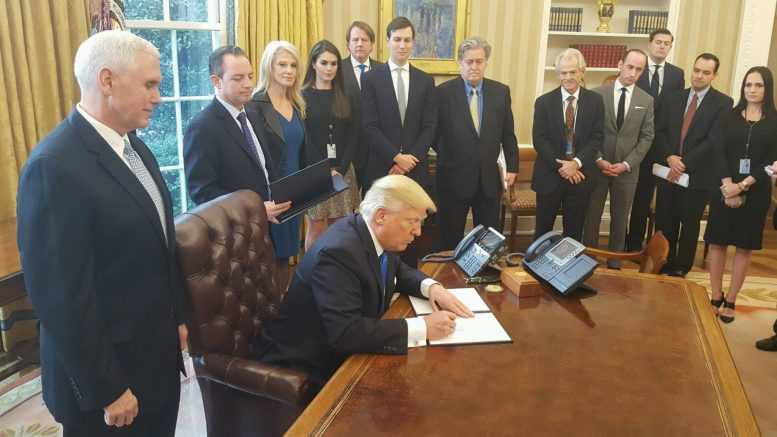Amidst the flurry of executive orders signed by U.S. President Donald J. Trump — starting four hours after his inauguration on Jan. 20 — were several that benefited the resource sector, and there are likely a few more business-friendly changes to come in the months ahead.
Among the headline-grabbers was Trump’s promise to quickly approve Energy Transfer Partners’ Dakota Access Pipeline for Bakken crude after a new environmental study and the building of TransCanada’s 1,900 km Keystone XL pipeline to bring Canadian diluted bitumen to refineries in Texas.
Although it may take years before construction begins on Keystone, its completion would affect production decisions and mining rates at Canada’s open-pit oilsands operations. With former ExxonMobil CEO and chairman Rex Tillerson leading the U.S. State Department, it seems a given that the State Department will approve this major cross-border energy project.
There are also suggestions the Trump administration will speed up reviews for liquid natural gas (LNG) terminals and natural gas pipelines, which will compete directly with Canadian proposed LNG megaprojects.
Miners are perhaps most interested in how the Interior Department and its Bureau of Land Management shapes up under the new administration. Trump’s nominee for secretary of the department is Montana Representative Ryan Zinke, who is a retired Navy SEAL and Iraq war veteran re-elected to his second term in November, and a member of the House Committee on Natural Resources.
Given Trump’s election promise to make America “energy independent,” Zinke will likely be tasked with expanding oil and gas drilling and loosening regulations both on and offshore, especially by reversing the Obama administration’s ban on drilling in parts of the Arctic and Atlantic oceans, and in some newly designated national monuments.
In mining, Zinke has already backed legislation that would end the Interior Department’s moratorium on coal leasing. Zinke took a softer tone in his Senate confirmation hearings, stressing his belief in strong land conservation and environmental protection, and reluctance to sell off any public lands.
Trump’s pick to lead the Environmental Protection Agency (EPA) is Oklahoma Attorney General Scott Pruitt, a socially conservative lawyer who once served as state senator for the Tulsa area.
Opponents of the EPA who criticize the agency for overstepping its bounds will be heartened to know that Pruitt has in the past sued the EPA to block its carbon emission-capping Clean Power Plan and has been vocal in supporting the rollback of EPA regulations imposed in the oil and gas industry, which is critical to Oklahoma’s economy.
Northern Dynasty Minerals has had a huge run up in share price from $1 to $4 with Trump’s surprise win and expectations of a new mining-friendly EPA, as it was the EPA that put a hold on its monster-sized Pebble copper-gold mine development in Alaska, which has many environmental aspects due to its location under salmon-spawning grounds and other sensitive wildlife zones. Northern Dynasty was able to emerge from hibernation and close a $37-million bought-deal financing at US$1.85 per share on Jan. 26.
Meanwhile former Texas Governor Rick Perry is in line as secretary of the Energy Department that he famously wanted to eliminate while running for president five years ago, though he says he has since changed his mind.
Apart from his many statements in favour of the oil and gas industry, Perry also said he would look at alternatives to the long-stalled Yucca Mountain nuclear waste repository in Nevada, which has drawn much local opposition despite Nevada’s long connection to nuclear weapons and energy, and intermittent uranium mining and exploration.
Trump has demanded that all department heads “submit a list of every wasteful and unnecessary regulation that kills jobs and does not improve public safety, and eliminate them.”
Trump’s vision is to “end the radical regulations that force jobs out of our communities and inner cities. We will stop punishing Americans for working and doing business in the United States.”
He pledges to “eliminate our most intrusive regulations, like the Waters of The United States Rule … [and] scrap the EPA’s so-called Clean Power Plan, which the government estimates will cost $7.2 billion a year.”



Be the first to comment on "Editorial: Resource regulators under Trump"